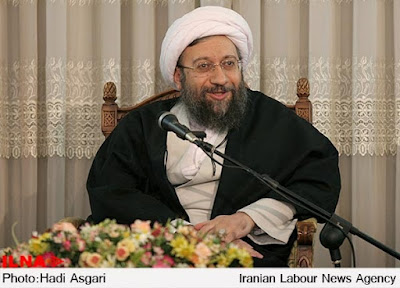 |
| Sadegh Amoli Larijani |
Iran's head of Judiciary, Sadegh Amoli Larijani, recently said that the Judiciary
has no plans to abolish the death penalty and called on Iranian judicial officials to not hesitate in carrying out the execution sentences for alleged drug offenders.
Amoli Larijani's official remarks were made on Thursday September 29 in Mashhad, at the 13th annual conference for Iran's revolutionary, military and public courts.
According to Iranian state run media, Fars, in his remarks Amoli Larijani referred to drug traffickers as "merchants of death" and rejected calls for the complete abolition of the death penalty for crimes related to drug trafficking. "Executions are not necessarily desirable, but narcotics are a great detriment to society and also shatter families. We have no choice but to confront the issue quickly, swiftly, firmly, and decisively. We want prosecutors in the country to not to hesitate in implementing the (death) sentences," said Amoli Larijani. "We should not wait 3 years (before carrying out the execution sentences), until the prisoner learns how to pray in order to get amnesty...It is offensive to say that the death penalty is ineffective. If it wasn't for the strictness of the Judiciary, the situation would be much worse."
Amoli Larijani's execution order comes 2 weeks after Mohammad Javad Larijani, Iran's chief of the Judiciary's "human rights council", visited several countries in Europe, including Italy, for human rights dialogue with European officials.
Just last month, the deputy of the Judiciary Chief, Mohammad Bagher Olfat, said that executing drug offenders in Iran has not decreased the volume of drugs: "The reality is that the death penalty for drug traffickers has not acted as a deterrent so far. We fought against many drug traffickers in accordance to the law, but, unfortunately, the volume of drugs entering and transiting through the country has increased...It is important to note that the individuals who are being executed are not the main drug traffickers, because the main drug traffickers are not involved in the shipment of drugs."
Iran Human Rights warns against mass executon of drug offenders after the Judiciary chief's statements. "Iran may be entering a new period of a high number of executions," says Mahmood Amiry-Moghaddam, spokesperson for Iran Human Rights. In 2015, Iranian authorities executed nearly 1000 people on Sadeq Amoli Larijani's orders. According to Iran Human Rights, majority of the prisoners were executed on drug-related charges.
"When the Judiciary Chief instructs prosecuters to not hesitate in carrying out the execution sentences for drug offenders or to wait until the prisoners gain eligibility for amnesty, he is actually giving the execution order of thousands of prisoners at a much higher speed than before.
The international community must take Mr. Larijani's execution order seriously. One option is that the UNODC could halt its anti-narcotic cooperation with Iran," says Amiry-Moghaddam. "While several top Iranian officials, among them Mr. Olfat, have admitted that executions are not a deterrent against drugs, Mr. Amoli Larijani, without presenting any new evidence, has claimed the opposite."
According to Iran Human Rights, Iranian authorities have executed at least 65 people in the past month. 51 of these executions were reportedly carried out for drug-related offenses.
Source: Iran Human Rights, October 3, 2016
People in Ahvaz protest against execution of 2 youths
On Thursday, September 29, a group of Ahvazi youths staged a protest at night against the Iranian regime by setting up fire and chanting anti-government slogans in Enqelab Avenue in the south-western city of Ahvaz to show their protest against the execution of 2 young ethnic Arabs of the city.
The 2 youths were Adnan Mazban al-Amouri and Ali Sharif al-Amouri, residents of Ghaleh Chan'an in Khuzestan province (south-western Iran), who were executed on Wednesday September 28 in Gohardasht Prison (north-west of Tehran) allegedly on the charges of "armed robbery" and "acting against national security."
According to the regime's state-run Tasnim news agency, these two young people were charged with "Moharebeh (enmity against God)" and sentenced to death by Branch 15 of Tehran's revolutionary court. Their sentences were then confirmed by Branch 14 of Supreme Court and implemented on Wednesday morning in Gohardasht (Rajai-Shahr) Prison in Karaj.
1 of the relatives of the al-Amouris pointed out that the men did not receive due process and there was discrimination in the implementation of the sentence. The relative said: "Discrimination is evident in all the affairs of this country. Why the 1st and 2nd row defendants were not executed but the 3rd and 4th row defendants were executed, because they were Arabs."
He continued: "We protested against the sentence in all (government) institutions but corruption and bribery have penetrated everywhere and we were not able to pay the brokers and intermediaries."
Source: NCR-Iran, October 3, 2016
⚑ | Report an error, an omission; suggest a story or a new angle to an existing story; send a submission; recommend a resource; contact the webmaster, contact us:
deathpenaltynews@gmail.com.
Opposed to Capital Punishment? Help us keep this blog up and running! DONATE!













.jpg)